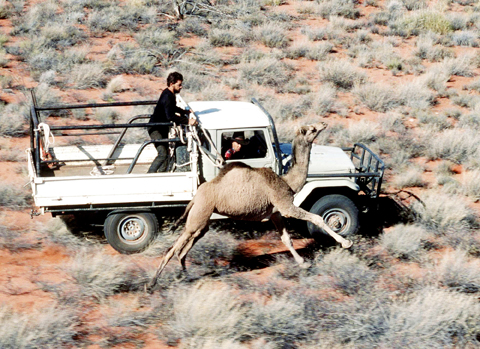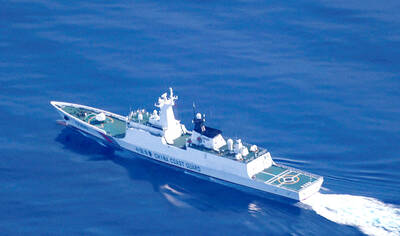Thousands of camels in Australia’s remote Outback could be killed by marksmen in helicopters under a government proposal aimed at cutting down the population of the havoc-wreaking creatures.
First introduced into Australia in the 1840s to help explorers travel through the Australian desert, there are now about 1 million camels roaming the country, with the population doubling every nine years.
They compete with sheep and cattle for food, trample vegetation and invade remote settlements in search of water, scaring residents as they tear apart bathrooms and rip up water pipes.

PHOTO: AP
Last month, the federal government set aside A$19 million (US$16 million) for a program to help slash the population. Besides sending in sharpshooters in helicopters and on foot, officials are considering proposals to turn some of the creatures into tasty treats such as camel burgers.
Hunters in the US have shot wolves from helicopters in Alaska in an aerial predator control program there. More than 800 wolves have been killed as part of the program, which has been a point of national controversy since it was initiated five years ago.
Glenn Edwards, who is working on drafting the Australian government’s camel reduction program, said the population needs to be slashed by two-thirds to reduce catastrophic damage.
But some remain opposed to a mass slaughter. Camel exporter Paddy McHugh, who runs camel catching operations throughout Australia, said a cull would be ineffective.
“What happens in 15 years when the numbers come back again? Do we waste another 20 million [Australian dollars]?” McHugh said.
The camels McHugh’s associates capture are sold overseas, used in tourism and processed for their meat. In recent years, McHugh said he has seen an explosion in international demand for the animals.
The main problem with trying to capture and export the animals is that they can grow up to 2.1m tall and weigh 900kg, said Patrick Medway, president of the Wildlife Preservation Society of Australia.
“You imagine trying to catch a lion or a tiger or an elephant in its native habitat and then bring it back and sell it to another country,” Medway said.
Tony Peacock, chief executive officer of the University of Canberra’s Invasive Animals Cooperative Research Center, said a cull was the most effective method.
“To be shot from a helicopter is actually quite humane, even though that sounds brutal,” he said. “If I was a camel, I’d prefer to just get it in the head.”
Mark Pearson, of the animal welfare group Animal Liberation New South Wales, offered another solution: drugging the animals to render them infertile.
But Edwards said even if you could get close enough to administer birth control, camels still live up to 30 years — meaning decades more damage to the environment.
Edwards favored an integrated approach that would include shooting some camels for their meat, with others left behind to decompose.

‘HYANGDO’: A South Korean lawmaker said there was no credible evidence to support rumors that Kim Jong-un has a son with a disability or who is studying abroad South Korea’s spy agency yesterday said that North Korean leader Kim Jong-un’s daughter, Kim Ju-ae, who last week accompanied him on a high-profile visit to Beijing, is understood to be his recognized successor. The teenager drew global attention when she made her first official overseas trip with her father, as he met with Chinese President Xi Jinping (習近平) and Russian President Vladimir Putin. Analysts have long seen her as Kim’s likely successor, although some have suggested she has an older brother who is being secretly groomed as the next leader. The South Korean National Intelligence Service (NIS) “assesses that she [Kim Ju-ae]

In the week before his fatal shooting, right-wing US political activist Charlie Kirk cheered the boom of conservative young men in South Korea and warned about a “globalist menace” in Tokyo on his first speaking tour of Asia. Kirk, 31, who helped amplify US President Donald Trump’s agenda to young voters with often inflammatory rhetoric focused on issues such as gender and immigration, was shot in the neck on Wednesday at a speaking event at a Utah university. In Seoul on Friday last week, he spoke about how he “brought Trump to victory,” while addressing Build Up Korea 2025, a conservative conference

China has approved the creation of a national nature reserve at the disputed Scarborough Shoal (Huangyan Island, 黃岩島), claimed by Taiwan and the Philippines, the government said yesterday, as Beijing moves to reinforce its territorial claims in the contested region. A notice posted online by the Chinese State Council said that details about the area and size of the project would be released separately by the Chinese National Forestry and Grassland Administration. “The building of the Huangyan Island National Nature Reserve is an important guarantee for maintaining the diversity, stability and sustainability of the natural ecosystem of Huangyan Island,” the notice said. Scarborough

DEADLOCK: Putin has vowed to continue fighting unless Ukraine cedes more land, while talks have been paused with no immediate results expected, the Kremlin said Russia on Friday said that peace talks with Kyiv were on “pause” as Ukrainian President Volodymyr Zelenskiy warned that Russian President Vladimir Putin still wanted to capture the whole of Ukraine. Meanwhile, US President Donald Trump said that he was running out of patience with Putin, and the NATO alliance said it would bolster its eastern front after Russian drones were shot down in Polish airspace this week. The latest blow to faltering diplomacy came as Russia’s army staged major military drills with its key ally Belarus. Despite Trump forcing the warring sides to hold direct talks and hosting Putin in Alaska, there